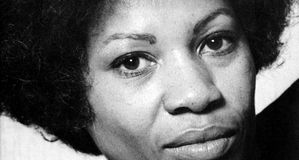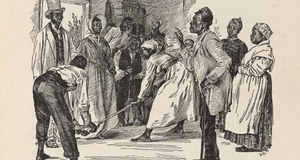Naming and Identity in Toni Morrison's Beloved and Song of SolomonSethe defends herself, claiming there was no other way to resolve the situation. She refused to let her children experience the horror of slavery. Paul D. responds by saying, “You got two feet, Sethe, not four” (Morrison, 1987, p. 194). She acted like an animal by killing her own kin. Sethe rationalizes her actions by claiming, “I took and put my babies where they’d be safe” (Morrison, 1987, p. 193). She says she acted out of love, but it remains challenging to discredit the theory that Sethe behaved like an animal because she had been treated like one. Schoolteacher taught his nephews that she was less than human. Once they took that to heart, they took Sethe’s milk. Schoolteacher’s construction of a false image of African Americans echoes J.M. Coetzee’s Waiting for the Barbarians. In Coetzee’s novel, The Empire (a powerful government like entity that most likely represents England) has captured barbarians from a distant land and brought them home to prove to its citizens that barbarians do exist. Once the barbarians are trussed up and brought out into a public viewing of sorts, “The Colonel steps forward. Stooping over each prisoner in turn he rubs a handful of dust into his naked back and writes a word with a stick of charcoal: ENEMY…ENEMY…” (Coetzee, 1980/2012, p. 2986). Here, as Schoolteacher does at Sweet Home, The Colonel imposes a name, an identity, a definition, upon African Americans. After he does that, his people begin believing that the barbarians are enemies, even though they have no tangible proof to support that theory. Even names given to nonhumans can have significance. Paul D. is haunted by the memory of having a bit placed in his mouth and then seeing the roosters walking free around the yard. He remembers how seeing the rooster Mister was especially difficult because “[The] son of a bitch couldn’t even get out the shell by hisself but he was still king and I was…” (Morrison, 1987, p. 86). Paul D. cannot complete this sentence, but he was broken. The bit took away his humanity. He was transformed into “something else that…was less than a chicken sitting in the sun on a tub” (Morrison, 1987, p. 86). The rooster’s name implies that the Schoolteacher also views his slaves as subordinate to animals. It is afforded more respect and dignity than the slaves.According to Kristin Boudreau (1995), Paul D. suffered from a common consequence of torture: He lost his voice, both literally and metaphorically. He no longer felt like an individual who had intrinsic value. When Schoolteacher purchased Paul D., the black man “discovers his worth, which is to say he learns his price” (Morrison, 1987, p. 267). He is like cattle to the white man. In her article, Boudreau (1995) mentioned how this acute awareness of the body stemmed from torture, which “makes one [part of a human], the body, emphatically and crushingly present by destroying it, and makes the other, the voice, absent by destroying it” (p. 453). Some former slaves, such as Sethe, try to blot out the past to disassociate themselves from this torture. Paul D. tries to close up his heart in a little tobacco tin and let it rust itself shut. However, by not facing the past head on, these characters allow it to continue affecting their lives. Boudreau (1995) believed, “In order to rise, fully human, above the world, the narrator must make it [the past] his—the long historical chain of suffering that binds him to his family and his race” (p. 449). Sixo achieves this rise by naming his son just before he is killed. He names his son Seven-O. This name is not only a play on his own name, but also a defiance of the white man’s wishes. By giving his son a number one higher than his own, Sixo is saying that there will always be at least one other black man out there. Try as they might, the white men cannot expunge all African Americans from the world. Through his son, Sixo is mocking the dream of the white slave owners. He has both accepted his past and revolted against it in one action. Baby Suggs is another character who accepts her past by accepting her black name. When she is freed and Mr. Garner is taking her to the Bodwins, the topic of her name comes up in conversation. Mr. Garner advises her to go by her white name, Jenny Whitlow, saying that Baby Suggs “ain’t no name for a freed Negro” (Morrison, 1987, p. 167). She prefers to keep the name because it “was all she had left of the ‘husband’ she claimed” (Morrison, 1987, p. 168). The name is appropriate later in life for Baby Suggs as well because she takes care of so many babies: Denver, Howard, Buglar, and Beloved. According to Jimenez (2002), during slavery, “older women assumed the role of mother or mama to all the children under their care, biologically related or not” (p. 527). Additionally, “during slavery and the decades following, grandmothers were the family and community healers…” (Jimenez, 2002, p. 528). Obviously, this fits into Baby Suggs’ role as an unofficial preacher who does her work at the Clearing. She preaches the message of self-love, one that opposes the message of slavery: You are less than human. As Morrison says, “The collective sharing of that information [at the Clearing] heals the individual—and the collective” (Darling, 1988, pp. 5-6). Baby Suggs lives up to the responsibilities that come with being an African American grandmother. Her name is fully linked to her past and is also completely intertwined with her identity. She is simultaneously unique and a member of the black community at large. Boudreau’s idea of owning the past also applies to the characters in Song of Solomon. The Dead family does not own their identity. It was created for Macon Dead’s father by a drunk Yankee. Macon’s father was a slave, so he had to register with the Freedmen’s Bureau after the Civil War. The white man asked him where he was from, and who his father was. Macon’s father answered, “Macon” and “He’s dead” to these two questions. The white man “had him born in Dunfrie, wherever the hell that is, and in the space for his name the fool wrote, ‘Dead’ comma ‘Macon’” (Morrison, 1977, p. 53). When Milkman asks Macon why his father didn’t use his real name, Macon responds, “Mama liked it. Liked the new name. Said it was new and would wipe out the past. Wipe it all out” (Morrison, 1977, p. 54). So, in a way, this “wrong” name fits Macon’s family well. His mother wanted the past to be erased. The name “Macon Dead” implies that Macon, her former home, is gone. In light of this insight, the following quote from Milkman’s father becomes incredibly ironic: “Let me tell you right now the one important thing you’ll ever need to know: Own things. And let the things you own own other things. Then you’ll own yourself and other people too. Starting Monday, I’m going to teach you how” (Morrison, 1977, p. 55). Macon is encouraging Milkman to own things, but he does not own his heritage. He considers it unimportant because it does not hold tangible value like his houses, his car, and his money. However, he does not use these things as tools to gain further pleasure. For instance, when he is remembering the first time he met Ruth, he thinks, “It was because of those keys that he could dare to walk over to that part of Not Doctor Street and approach the most important Negro in the city…” (Morrison, 1977, p. 23). He does not ever mention that he loves Ruth. He is more or less telling Dr. Foster that he possesses great credentials, and it makes sense that he would be the gentleman caller of the daughter of the town’s most important Negro. This also proves that everything in Macon’s life is run by business, as we see in his exchange with Mrs. Bains on the previous page. She asks, “What’s it gonna profit you, Mr. Dead, sir, to put me and them children out?” He answers, “Saturday, Mrs. Bains” (Morrison, 1977, p. 22). Macon is naturally greedy, and takes things because he can. He also believes pleasure is in the possession of a thing. When Macon tells his family that he will rent out summer homes to Negroes, Corinthians laughs at him and says they don’t like water. Macon’s rebuttal? “They’ll like it if they own it” (Morrison, 1977, p. 35). Since Macon’s name was created by a white man, he is made in their image. He tries to obtain the typical, white American dream. Macon’s identity (or lack thereof) and money loving nature are passed down to his son, Macon Junior, also known as Milkman. It is appropriate that Milkman cannot discover who he is and is called by a name that he does not accept. After all, his father did not identify with his own family or the African American community at large. It is also fitting that Milkman is his nickname because, for much of the novel, he is little more than an overgrown baby. He acquires the nickname when Freddie, the Dead’s janitor and tenant, sees Ruth breastfeeding not Macon Jr. the infant, but Macon Jr. the toddler. Milkman stayed in his mother’s arms too long, and he overstays his welcome at his home as well. Just after he responds to his father punching his mother in the jaw, Milkman examines himself in the mirror: “He had a fine enough face. Eyes women complimented him on, a firm jaw line, splendid teeth. Taken apart, it looked all right…But it lacked coherence, a coming together of the features into a total self…” (Morrison, 1977, p. 69). Milkman is even less than an everyman. He is nothing more than a near lifeless extension of his father, as evidenced by his early thoughts about his interests and his future: “If he had to spend the rest of his life thinking about rents and property, he’d lose his mind. But he was going to spend the rest of his life doing just that, wasn’t he?” (Morrison, 1977, p. 107). Although he is living out a nondescript existence, Milkman constantly sucks up the time, energy, and resources of the people around him. Hagar, for example, is hopelessly devoted to Milkman and wants literally nothing more than to be everything to him. She allows him to have sex with her whenever he pleases. To Milkman, Hagar is nothing more than “the third beer. Not the first one…nor the second, that confirms and extends the pleasure of the first. But the third, the one you drink because it’s there, because it can’t hurt…” (Morrison, 1977, p. 91). Milkman’s total indifference affects not only Hagar, but also extends to his family members. He expects that they, like Hagar, will always be there for him and will always take care of him. In short, he takes them for granted, just as he takes his money, his fine clothes, and his car for granted. Milkman does nothing to acquire any of these goods. Simply being the first born son of Macon Dead gave him a title to the world. This sense of entitlement, coupled with the fact that Milkman broke up Corinthians and Mr. Porter, leads Lena to rail angrily against him: “Our girlhood was spent like a found nickel on you…You have yet to wash your own underwear, spread a bed, wipe the ring from your tub, or move a fleck of dirt from one place to another. And to this day, you have never asked one of us if we were tired, or sad…” (Morrison, 1977, p. 215). Milkman has nothing to be proud of, nothing to call his own, except for his “little hog’s gut” (Morrison, 1977, p. 216). Yet, he expects the world to bow to his will and provide for him, even though he contributes nothing of significance to it. While Milkman does have many shortcomings, it cannot be disputed that his family, outside of Pilate, offers little help in overcoming them. In the book Dangerous Freedom: Fusion and Fragmentation in Toni Morrison’s Novels, Philip Page (1995) mentioned that, by not accepting the name “Solomon,” the Dead family is throwing away nuggets of wisdom that could be gleaned from their history. According to the Bible, King Solomon possessed great wisdom, wealth, and power. While Macon Dead does possess two of those three qualities, his refusal to accept both his own ancestry and the ancestry of African Americans in general keeps him mired in ignorance. For instance, when Milkman asks Macon who shot his father, he clams up. He doesn’t even remember his father’s name. Additionally, when Milkman goes with Guitar to see Pilate, Milkman realizes that his father never explained why he had to stay away from Pilate in the first place. Macon says, “You’re my own son. And you will do what I tell you to do. With or without explanations” (Morrison, 1977, p. 50). In a sense, Milkman is a slave to his father. He is being told to blindly follow orders. His father will not guide him to his identity. At one point in the novel, Milkman asks Guitar what his name means. Guitar basically says, “How the hell should I know?” This is the issue with Macon’s denial of his history. It creates questions, and eventually, a quest, for Milkman.Continued on Next Page » Suggested Reading from Inquiries Journal
Inquiries Journal provides undergraduate and graduate students around the world a platform for the wide dissemination of academic work over a range of core disciplines. Representing the work of students from hundreds of institutions around the globe, Inquiries Journal's large database of academic articles is completely free. Learn more | Blog | Submit Latest in Literature |
















